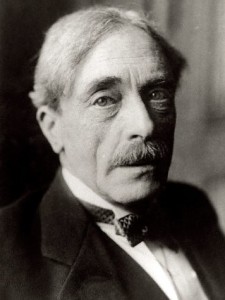 Poet Paul Valery was born in the Mediterranean town of Sete in 1871 before moving to the French city of Montpelier where he spent the majority of his childhood. Throughout his life and beyond, Valery was a poet, essayist and writer who was largely difficult to categorize. He grew out of the symbolist tradition of the time and was greatly influenced by French poet Stephane Mallarme, whose death led him to give up publishing his writing for nearly 20 years.
Poet Paul Valery was born in the Mediterranean town of Sete in 1871 before moving to the French city of Montpelier where he spent the majority of his childhood. Throughout his life and beyond, Valery was a poet, essayist and writer who was largely difficult to categorize. He grew out of the symbolist tradition of the time and was greatly influenced by French poet Stephane Mallarme, whose death led him to give up publishing his writing for nearly 20 years.
Paul Valery went to school in Montpelier and then chose to study to be a lawyer at the university. His great desire, though, was to live the life of a poet and he moved to Paris where he became part of the enclave of Stephane Mallarme, one of the major symbolist poets of the time. Although Valery is best known as a poet, he was not prolific and in 1892 he underwent an epiphany and crisis that would affect his writing for the rest of his life.
When Mallarme died in 1868, Valery put down his pen and did not publish anything until 1917. Two years later he married Jeannie Gobillard and settled down to a life away from the literary world. He worked at the War Ministry for a while before taking up a position as a private secretary to a man called Lebey. When Lebey died, Valery picked up his pen seriously once more and became a full time writer around 1920 at the age of 49.
It took him 4 years to write La Jeune Parque which later came to be considered as one of the great French poems of the last century. It is narrated by a woman who ponders on matters of both life and death and is often seen as an allegorical story of the way fate intervenes in all our lives. His prose works are far more numerous and he is well-known for satirical aphorisms and skeptical bon mots that also set him apart as one of the great thinkers of the time.

Whilst he was within his ‘great silence’ where he published nothing for 20 years, Valery kept copious notebooks that he wrote in every morning, musing on everything from science to politics. Earlier works from the pen of Paul Valery also include a collection of short verses in Album des vers ancien and Charmes, which have since confirmed his place as one of France’s poetical giants.
In 1931, Valery founded the Cannes International College that was dedicated to teaching French and all aspects of civilization and remains a force for education even today. He was an active member of the French Academy and often gave lectures and toured Europe promoting the cultural life of France.

He is said to have influenced many poets who followed, including T.S. Eliott and John Ashbury, because of his style that borrowed heavily on the symbolist tradition and the world of philosophy. Paul Valery died in 1945 in Paris and his body was taken to his birthplace of Sete for burial.

